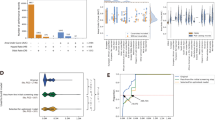Abstract
The TGFBR1*6A (*6A) variant in exon 1 of the TGFBR1 gene has been postulated as a putative tumor susceptibility allele in several studies. We have performed a case–control study in 537 men with histologically verified prostate cancer and in 488 unrelated controls to investigate the association of *6A with prostate cancer. Our results revealed that the frequency of the *6A allele does not differ in men with prostate cancer compared to healthy controls, even in a subset of age-matched cases and controls. There is no compelling evidence for an association of the *6A variant with prostate cancer.
This is a preview of subscription content, access via your institution
Access options
Subscribe to this journal
Receive 4 print issues and online access
$259.00 per year
only $64.75 per issue
Buy this article
- Purchase on Springer Link
- Instant access to full article PDF
Prices may be subject to local taxes which are calculated during checkout
Similar content being viewed by others
References
Jemal A et al. Cancer statistics, 2003. CA Cancer J Clin 2003; 53: 5–26.
Lichtenstein P et al. Environmental and heritable factors in the causation of cancer — Analyses of cohorts of twins from Sweden, Denmark, and Finland. N Eng J Med 2000; 343: 78–85.
Markowitz S et al. Inactivation of type II TGF-β receptor in colon cancer cells with microsatellite instability. Science 1995; 268: 1336–1338.
Kim IY et al. Genetic change in transforming growth factor β (TGF-β) receptor type I gene correlates with insensitivity to TGF-β 1 in human prostate cancer cells. Cancer Res 1996; 56: 44–48.
DeCoteau JF et al. Loss of functional cell surface transforming growth factor β (TGF-β) type 1 receptor correlates with insensitivity to TGF-β in chronic lymphocytic leukemia. Proc Natl Acad Sci USA 1997; 94: 5877–5881.
Chen T, Carter D, Garrigue-Antar L, Reiss M . Transforming growth factor β type 1 receptor kinase mutant associated with metastatic breast cancer. Cancer Res 1998; 58: 4805–4810.
Ohwada M et al. Mutational analysis of transforming growth factor β receptor type II and DNA mismatch repair genes in sporadic endometrial carcinomas with microsatellite instability. Oncol Rep 2000; 7: 789–792.
Wang D et al. Analysis of specific gene mutations in the transforming growth factor-β signal transduction pathway in human ovarian cancer. Cancer Res 2000; 60: 4507–4512.
Baxter SW, Choong DYH, Eccles DM, Campbell IG . Transforming growth factor β receptor 1 polyalanine polymorphism and exon 5 mutation analysis in breast and ovarian cancer. Cancer Epidemiol Biomarkers Prevention 2002; 11: 211–214.
Pasche B et al. Type I transforming growth factor β receptor maps to 9q22 and exhibits a polymorphism and a rare variant within a polyalanine tract. Cancer Res 1998; 58: 2727–2732.
Pasche B et al. T beta R-I(6A) is a candidate tumor susceptibility allele. Cancer Res 1999; 59: 5678–5682.
Samowitz WS, Curtin K, Leppert MF, Slattery ML . Uncommon TGFBRI allele is not associated with increased susceptibility to colon cancer. Genes Chromosome Cancer 2001; 32: 381–383.
Kaklamani VG et al. TGFBR1*6A and cancer risk: a meta-analysis of seven case-control studies. J Clin Oncol 2003; 21: 3236–3243.
Pasche B et al. TGFBR1*6A and cancer: a meta-analysis of 12 case-control studies. J Clin Oncol 2004; 22: 756–758.
Smith DS, Humphrey PA, Catalona WJ . The early detection of prostate carcinoma with prostate specific antigen — The Washington University Experience. Cancer 1997; 80: 1852–1856.
Lange K, Weeks D, Boehnke M . Programs for pedigree analysis: MENDEL, FISHER and dGENE. Genet Epidemiol 1988; 5: 471–472.
Boehnke M . Allele frequency estimation from data on relatives. Am J Hum Genet 1991; 48: 22–25.
Chen T et al. Structural alterations of transforming growth factor-beta receptor genes in human cervical carcinoma. Int J Cancer 1999; 82: 43–51.
Van Tilborg AA, de Vries A, Zwarthoff EC . The chromosome 9q genes TGFBR1, TSC1, and ZNF189 are rarely mutated in bladder cancer. J Pathol 2001; 194: 76–80.
Wikström P, Bergh A, Damber J-E . Transforming growth factor-β1 and prostate cancer. Scan J Urol Nephrol 2000; 34: 85–94.
Acknowledgements
This work was supported by an award from the Urological Research Foundation, St Louis.
Author information
Authors and Affiliations
Corresponding author
Rights and permissions
About this article
Cite this article
Suarez, B., Pal, P., Jin, C. et al. TGFBR1*6A is not associated with prostate cancer in men of European ancestry. Prostate Cancer Prostatic Dis 8, 50–53 (2005). https://doi.org/10.1038/sj.pcan.4500765
Received:
Revised:
Accepted:
Published:
Issue Date:
DOI: https://doi.org/10.1038/sj.pcan.4500765
Keywords
This article is cited by
-
TGFBR1*6A/9A polymorphism and cancer risk: a meta-analysis of 13,662 cases and 14,147 controls
Molecular Biology Reports (2010)
-
Tagging SNPs in the kallikrein genes 3 and 2 on 19q13 and their associations with prostate cancer in men of European origin
Human Genetics (2007)
-
Variants in the HEPSIN gene are associated with prostate cancer in men of European origin
Human Genetics (2006)



